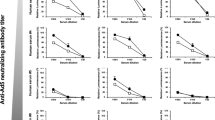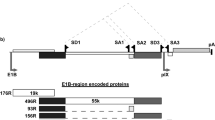Abstract
The utility of adenoviral vectors for cancer therapy is limited due to their lack of specificity for tumor cells. In order to target adenovirus to tumor, the natural tropism of the adenovirus should be ablated and replaced by a tumor-specific binding domain. To this end, a neutralizing anti-fiber antibody conjugated to an anti-EpCAM antibody was created that targets the adenovirus to the EpCAM antigen present on tumor cells. The EpCAM antigen was chosen as the target because this antigen is highly expressed on a variety of adenocarcinomas of different origin such as breast, ovary, colon and lung, whereas EpCAM expression is limited in normal tissues. In these studies, the EpCAM-targeted adenovirus was shown to infect specifically cancer cell lines of different origin expressing EpCAM such as ovary, colon and head and neck. Gene transfer was blocked by excess anti-EpCAM antibody and dramatically reduced in EpCAM negative cell lines, thus showing the specificity of the EpCAM-targeted adenovirus. Importantly, infection with targeted adenovirus was independent of CAR, which is the natural receptor for adenovirus binding, since blocking of CAR with recombinant fiber knob did not affect infection with targeted adenovirus. Apart from the cancer cell lines, the efficacy of targeted viral infection was studied in freshly isolated primary human colon cancer cells. As colon cancer predominantly metastasizes to liver, and adenovirus has a high tropism for hepatocytes, we also sought to determine if the EpCAM-targeted adenovirus showed reduced infectivity of human liver cells. The bispecific antibody could successfully mediate gene transfer to primary human colon cancer cells, whereas it almost completely abolished infection of liver cells. This work thus demonstrates that EpCAM-targeted adenoviral vectors can be specifically directed to a wide variety of adenocarcinomas. This approach may prove to be useful for selective gene therapy of cancer.
This is a preview of subscription content, access via your institution
Access options
Subscribe to this journal
Receive 12 print issues and online access
$259.00 per year
only $21.58 per issue
Buy this article
- Purchase on Springer Link
- Instant access to full article PDF
Prices may be subject to local taxes which are calculated during checkout



Similar content being viewed by others
References
Bergelson JM et al. Isolation of a common receptor for Coxsackie Bviruses and adenoviruses 2 and 5 Science 1997 275: 1320–1323
Douglas JT et al. Targeted gene delivery by tropism-modified adenoviral vectors Nature Biotechnol 1996 14: 1574–1578
Watkins SJ et al. The adenobody approach to viral targeting – specific and enhanced adenoviral gene delivery Gene Therapy 1997 4: 1004–1012
Rogers BE et al. Use of a novel cross-linking method to modify adenovirus tropism Gene Therapy 1997 4: 1387–1392
Wickham TJ et al. Targeted adenovirus gene transfer to endothelial and smooth muscle cells by using bispecific antibodies J Virol 1996 70: 6831–6838
Li W et al. Human colorectal cancer (CRC) antigen CO17-1A/GA733 encoded by adenovirus inhibits growth of established CRC cells in mice J Immunol 1997 159: 763–769
Edwards DP et al. Monoclonal antibody identification and characterization of a Mr 43,000 membrane glycoprotein associated with human breast cancer Cancer Res 1986 46: 1306–1317
Haisma HJ et al. Construction and characterization of a fusion protein of single-chain anti-carcinoma antibody 323/A3 and human beta-glucuronidase Cancer Immunol Immunother 1998 45: 266–272
Riethmuller G et al. Randomised trial of monoclonal antibody for adjuvant therapy of resected Dukes’ C colorectal carcinoma. German Cancer Aid 17-1A Study Group (see comments) Lancet 1994 343: 1177–1183
Woo DV, Li D, Mattis JA, Steplewski Z . Selective chromosomal damage and cytotoxicity of 125l-labeled monoclonal antibody 17-1a in human cancer cells Cancer Res 1989 49: 2952–2958
Wickham TJ et al. Adenovirus targeted to heparan-containing receptors increases its gene delivery efficiency to multiple cell types Nature Biotechnol 1996 14: 1570–1573
Krasnykh V et al. Characterization of an adenovirus vector containing heterologous peptide epitope in the Hi loop of the fiber knob J Virol 1998 72: 1844–1852
Yee D et al. Adenovirus-mediated gene transfer of herpes simplex virus thymidine kinase in an ascites model of human breast cancer Hum Gene Ther 1996 7: 1251–1257
Sterman DH et al. Adenovirus-mediated herpes simplex virus thymidine kinase/ganciclovir gene therapy in patients with localized malignancy – results of a phase I clinical trial in malignant mesothelioma Hum Gene Ther 1998 9: 1083–1092
Peters LC, Hanna MG Jr . Active specific immunotherapyof established micrometastases: effect of cryopreservationprocedures on tumor cell immunogenicity in guinea pigs J NatlCancer Inst 1980 64: 1521–1525
Herz J, Gerard RD . Adenovirus-mediated transfer of low density lipoprotein receptor gene acute accelerates cholesterol clearance in normal mice Proc Nat Acad Sci USA 1993 90: 2812–2816
Acknowledgements
This work was supported in part by the American Lung Association (DTC), the American Heart Association (DTC), NIH grants CA74242 (DTC), CA68245 (DTC), and RO1 HL-50255 (DTC).
Author information
Authors and Affiliations
Rights and permissions
About this article
Cite this article
Haisma, H., Pinedo, H., van Rijswijk, A. et al. Tumor-specific gene transfer via an adenoviral vector targeted to the pan-carcinoma antigen EpCAM. Gene Ther 6, 1469–1474 (1999). https://doi.org/10.1038/sj.gt.3300969
Received:
Accepted:
Published:
Issue Date:
DOI: https://doi.org/10.1038/sj.gt.3300969
Keywords
This article is cited by
-
Clinical development directions in oncolytic viral therapy
Cancer Gene Therapy (2011)
-
A Phase I Study of Telomerase-specific Replication Competent Oncolytic Adenovirus (Telomelysin) for Various Solid Tumors
Molecular Therapy (2010)
-
Transductional targeting of adenovirus vectors for gene therapy
Cancer Gene Therapy (2006)
-
An adenovirus vector with a chimeric fiber incorporating stabilized single chain antibody achieves targeted gene delivery
Gene Therapy (2006)
-
Frequent high-level expression of the immunotherapeutic target Ep-CAM in colon, stomach, prostate and lung cancers
British Journal of Cancer (2006)



